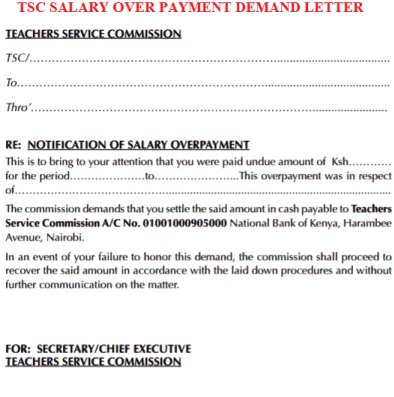STEPS FOR TSC SALARY OVERPAYMENT RECOVERY
“When it comes to carrying out the responsibilities of the Teachers Service Commission in managing teachers within the education system, financial management is typically a critical aspect.”
The Commission places a high value on integrity, responsibility, and high ethical standards in the performance of tasks, as well as the reporting of any erroneous payments or changes that result in excessive salary payments.
When a teacher becomes aware of an overpayment made by the Commission, it is the obligation of the Commission to decide the proper processes for recovery and the resulting sanctions.
Teachers’ employers will use a variety of tactics to collect overpaid cash from teachers who do not express problems.
TSC Overpayment Recovery Procedures:
1. The Commission recovers at least one-third of all employees’ basic salaries, guaranteeing that each employee maintains one-third of their basic wage as net pay.
2. TSC recovers all outstanding overpayments from salary arrears as well as any residual amount via payroll.
3. Through pay increments or salary modifications, TSC may adjust the pace of recovery of salary overpayment.
4. When an overpayment is discovered, TSC contacts the employee by demand letter.
5. TSC initiates proceedings to collect wage overpayments from departing employees.
6. The TSC may recommend a write-off for any overpayments deemed irrecoverable under Section 157 of the Public Finance Management Act of 2015.
In order for TSC to recover salary overpayments, the Commission Secretary must be satisfied that:
– Reasonable efforts have been made to recover losses, but the loss is irrecoverable.
– Additional efforts to recover the loss would be unprofitable.
– It is in the Commission’s best interests to settle or waive the claim.
If a TSC employee who is carrying an overpayment burden leaves the service before full recovery, the outstanding sum becomes due and must be paid in accordance with government laws.
In terms of criminal proceedings:
Any person found guilty of causing an overpayment or failing to disclose one will be reported to state agencies and other organizations for criminal prosecution. These circumstances constitute a crime.”






